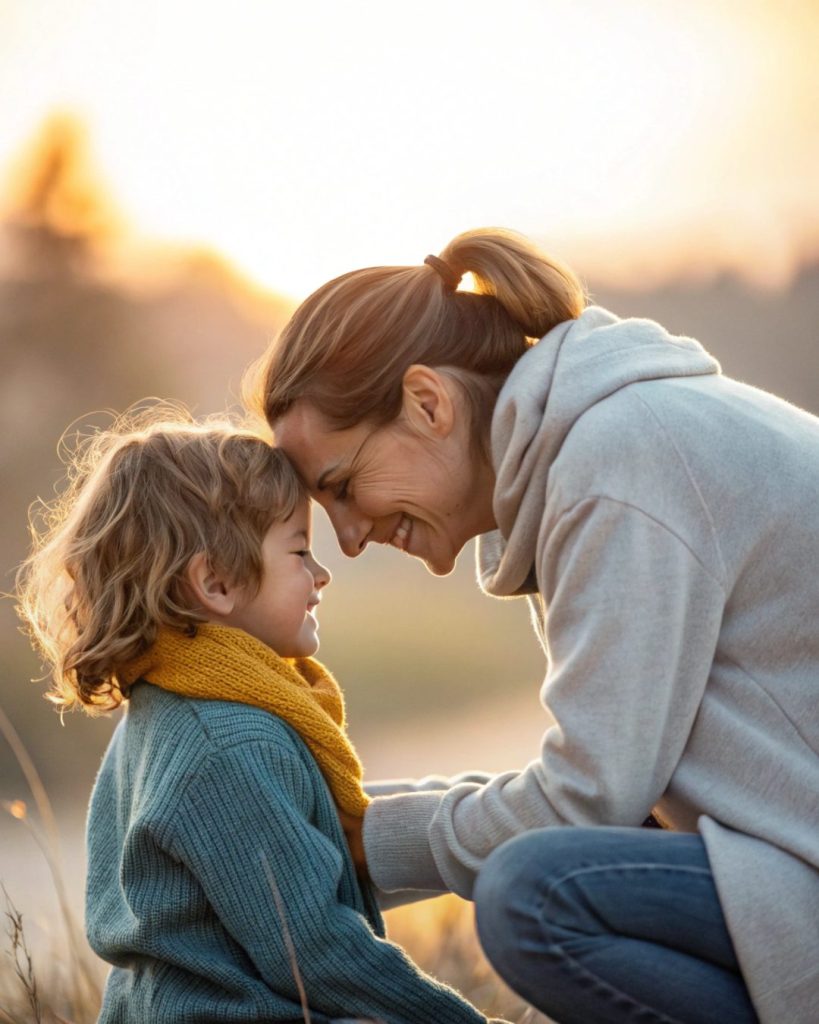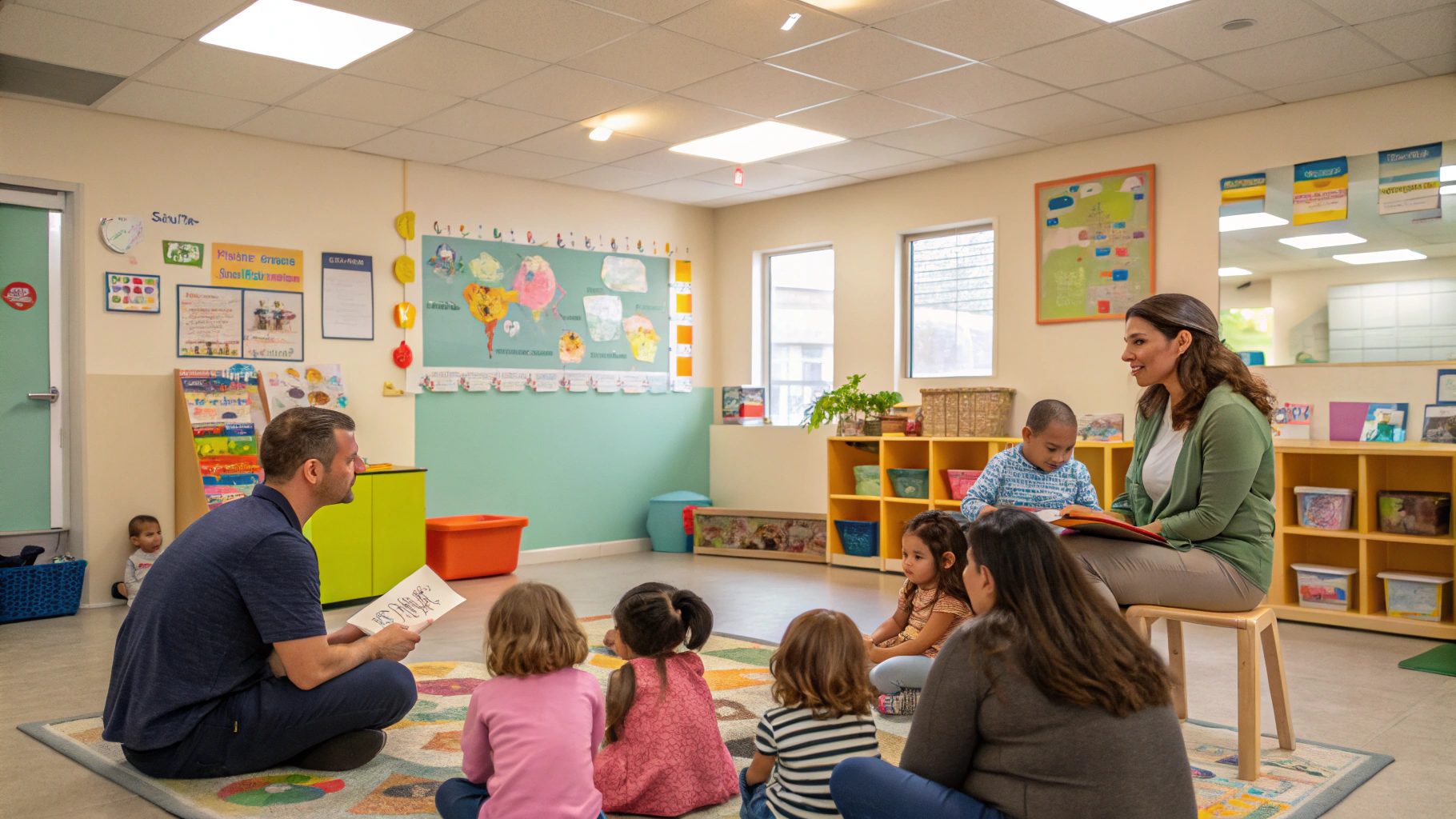As a parent of three who’s been writing about family life for over a decade, I’ve learned one universal truth: parenting doesn’t come with a manual.
We’re all figuring it out as we go, making mistakes, celebrating victories, and constantly wondering if we’re doing it right. That’s where parenting classes come in – they’re like having a roadmap when you’re in unfamiliar territory.
I remember attending my first parenting class when my oldest was just two. I was exhausted, overwhelmed, and honestly, feeling a bit lost. Walking into that community center classroom changed everything. Not only did I learn practical techniques for handling toddler tantrums, but I also found something equally valuable – a community of parents who were in the exact same boat.
Today, I want to share everything I’ve learned about parenting classes – what they are, why they matter, how to find the right one for your family, and what you can expect to gain.
Whether you’re expecting your first child or navigating the teen years, there’s a class out there that can offer guidance, support, and maybe even a much-needed break.
What Are Parenting Classes and Why Consider Them?
Parenting classes are structured learning environments where parents and caregivers gain knowledge, skills, and strategies to raise children effectively. They cover everything from basic infant care to handling complex behavioral challenges in teenagers.
Who Can Benefit from Parenting Classes?
The short answer? Everyone. Here’s why:
- First-time parents: Learning the basics before baby arrives can build confidence
- Parents facing specific challenges: Classes focused on special needs, behavioral issues, or developmental stages
- Blended families: Navigating the complexities of step-parenting and family integration
- Single parents: Finding strategies and support systems for solo parenting
- Experienced parents: Even veterans can learn new approaches and refresh their skills
- Grandparents or other caregivers: Updating childcare knowledge, especially if it’s been a while
I’ve met families from all walks of life in parenting classes. The corporate executive sitting next to the stay-at-home parent, the grandparent raising grandchildren beside the foster parent – all united by the desire to do better for the children in their lives.
Types of Parenting Classes Available

The beautiful thing about today’s parenting education landscape is its diversity. Whatever your parenting philosophy or specific needs, there’s likely a class designed for you.
By Age and Development Stage
- Prenatal/expectant parent classes: Preparing for birth and early infancy
- Baby care basics: Feeding, sleeping, development milestones
- Toddler and preschool parenting: Managing the famous “terrible twos” and beyond
- School-age children: Supporting academic success and social development
- Tween/preteen preparation: Getting ready for puberty and increasing independence
- Teen parenting: Communication, boundaries, and preparing for adulthood
By Parenting Approach or Philosophy
- Positive parenting: Focusing on encouragement and natural consequences
- Attachment parenting: Building strong emotional bonds
- Conscious parenting: Mindfulness and emotional awareness
- Religious-based parenting: Incorporating faith traditions into family life
- Montessori or other educational philosophies: Extending learning approaches into the home
By Specific Needs
- Special needs parenting: Supporting children with disabilities or medical conditions
- Adoptive parent training: Understanding unique adoption-related challenges
- Foster parent certification: Meeting requirements and preparing for fostering
- Behavioral management: Addressing specific behavioral challenges
- Co-parenting after divorce: Working together despite relationship changes
- Cultural adaptation: Supporting international adoptees or immigrant families
How to Find the Best Parenting Class for Your Family
With so many options available, finding the right class can feel overwhelming. Here’s how to narrow it down:
Assess Your Needs and Goals
Before searching for classes, ask yourself:
- What specific challenges am I facing?
- What parenting skills do I want to improve?
- What are my family’s values and parenting philosophy?
- What format works best for our schedule and learning style?
Where to Look for Quality Parenting Classes
- Local resources:
- Hospitals and birthing centers
- Community colleges and adult education programs
- Family resource centers
- Libraries
- Religious organizations
- School districts
- Online options:
- Virtual live classes
- Self-paced courses
- Webinar series
- Membership communities with ongoing support
- National organizations:
- Positive Parenting Program (Triple P)
- Parent Effectiveness Training (PET)
- The Incredible Years
- Circle of Security
- Love and Logic
Vetting a Parenting Class
Not all parenting education is created equal. Consider these factors:
- Instructor credentials: What training or experience do they have?
- Evidence-based content: Is the curriculum backed by research?
- Reviews and testimonials: What do past participants say?
- Philosophy alignment: Does the approach match your values?
- Format and accessibility: Does it fit your learning style and schedule?
- Cost and value: Is it within your budget? Are scholarships available?
What to Expect in a Typical Parenting Class
The structure varies widely depending on the type of class, but most include:
Common Elements
- Educational content: Information about child development and parenting strategies
- Skill-building exercises: Practice activities to develop specific parenting skills
- Group discussion: Opportunities to share experiences and challenges
- Role-playing scenarios: Practicing responses to common situations
- Take-home resources: Handouts, guides, or online materials for continued learning
- Follow-up support: Some classes offer ongoing consultation or community
In-Person vs. Online: Pros and Cons
Both formats have their advantages. In-person classes offer face-to-face community and immediate feedback, while online options provide flexibility and accessibility, especially for parents with tight schedules or those in rural areas.
I’ve personally found tremendous value in both. When my second child was born with medical complications, an online class about parenting children with special needs became my lifeline.
I could participate during late-night feeding sessions when leaving the house wasn’t an option.
The Benefits Beyond the Classroom

The value of parenting classes extends far beyond the specific techniques you’ll learn:
For Parents
- Increased confidence: Knowledge reduces anxiety and builds parenting self-esteem
- Stress reduction: Having strategies ready before challenges arise
- Support network: Connecting with other parents facing similar situations
- Improved mental health: Reduced isolation and practical coping strategies
- Better co-parenting: Shared language and approaches between caregivers
For Children
- More consistent parenting: Clear boundaries and expectations
- Stronger attachment: Enhanced parent-child bonding
- Improved behavior: Effective discipline strategies lead to better regulation
- Better outcomes: Research shows positive effects on academic success and social skills
- Intergenerational benefits: Breaking negative cycles and establishing healthy patterns
For Families
- Improved communication: Better ways to express needs and feelings
- Conflict reduction: Tools for resolving disagreements constructively
- Stronger relationships: More positive interactions build family cohesion
- Adaptability: Skills to navigate transitions and challenges together
Making the Most of Your Parenting Class Experience
To maximize your investment in parenting education:
- Come prepared: Bring specific questions and scenarios from your family life
- Participate actively: The more you engage, the more you’ll gain
- Take notes: You won’t remember everything in the moment
- Practice between sessions: Apply techniques right away to solidify learning
- Share with co-parents: Brief others on what you’re learning so approaches can be consistent
- Be patient with yourself: Changing parenting patterns takes time
I remember struggling to implement a particular bedtime routine technique we learned in a toddler parenting class. For two weeks, it seemed to make things worse.
I was ready to give up when our instructor reminded me that new approaches often face resistance before improvement. She was right – by week three, bedtime had transformed from a battleground to a peaceful ritual.
When Time Is Limited: Quick Parenting Resources
As a busy mom who’s constantly juggling responsibilities, I know that finding time for a multi-week parenting class isn’t always realistic.
That’s why I created “The 5-Minute Mom Blueprint: Reclaim Your Time, Sanity, and Joy” – a practical ebook that distills the most essential parenting strategies into bite-sized, actionable tips you can implement in just five minutes a day.
Many of the parents I’ve connected with through my blog have shared how this resource has been their “parenting class on the go” – something they can reference during those precious few minutes between soccer practice and dinner prep.
For parents specifically focused on emotional intelligence and raising resilient kids, my companion guide “Present Parent, Resilient Child: Mindful Parenting Guide + Audiobook” offers deeper insights into nurturing children’s emotional health while maintaining your own wellbeing.
The audiobook component makes it easy to absorb these concepts during commutes or while folding laundry – because I know how precious your time is.
Overcoming Common Barriers to Parenting Education
Despite the benefits, many parents hesitate to join parenting classes. Let’s address some common concerns:
“I don’t have time.”
Look for flexible formats, online options, or brief workshops. Even a single session can provide valuable insights.
“I can’t afford it.”
Many community programs offer free or sliding-scale options. Check with local family resource centers, libraries, or religious organizations.
“I’m afraid of being judged.”
Quality instructors create safe, non-judgmental environments. Remember, everyone is there to learn and improve.
“My partner isn’t interested.”
Start by going alone if necessary. Often, seeing positive results encourages reluctant co-parents to get involved.
“My child’s issues are unique.”
While every child is indeed unique, many parenting challenges follow predictable patterns. The principles you learn can be adapted to your specific situation.
A Personal Parenting Story: When Class Meets Reality
Let me share a quick story from my own parenting journey that illustrates how parenting classes can transform everyday moments:
My middle child went through an intense phase of emotional meltdowns around age four. One particular day at the grocery store, she collapsed in tears in the cereal aisle because I wouldn’t buy the sugar-loaded option she wanted. In the past, this would have triggered my own frustration and embarrassment.
But thanks to a positive discipline class I’d recently completed, I recognized this as an opportunity rather than just a crisis. I knelt down at her level, acknowledged her disappointment, and offered her appropriate choices instead of just saying “no.” Within minutes, she was helping me select a healthier cereal option, and we avoided what would have previously been a 20-minute standoff.
The tools I gained weren’t just about managing behavior—they were about connecting with my child and teaching her emotional regulation skills that would serve her for life.
How to Know If a Parenting Class Is Working for You
Effective parenting education should produce noticeable changes:
- Your confidence increases: You feel more sure of your parenting decisions
- Your stress decreases: Challenging situations feel more manageable
- Your relationship improves: More positive interactions with your child
- Your home atmosphere changes: Calmer, more cooperative family dynamics
- Your child’s behavior shifts: Not overnight, but gradual improvement
- Your parenting toolkit expands: More strategies to try in different situations
If you’re not seeing these changes after giving a class a fair try, it might not be the right approach for your family. That’s okay—parenting isn’t one-size-fits-all.
Where to Go From Here: Your Next Steps
Ready to explore parenting classes? Here are your next action steps:
- Identify your biggest parenting challenge right now
- Research local and online options that address that specific need
- Reach out to at least two programs for more information
- Schedule a time in your calendar to attend or begin an online course
- Prepare your family by explaining why you’re investing in this learning
Remember, seeking parenting education isn’t an admission of failure—it’s a sign of commitment and love. Every parent wants to do better, and every child deserves parents who are willing to learn and grow.
If you’re feeling overwhelmed by the options or unsure where to start, my “Present Parent, Resilient Child” guide includes a section on assessing your family’s specific needs and matching them to the right parenting resources.
The accompanying reflection exercises can help clarify which areas of parenting you most want to strengthen.
The Continuous Journey of Parenting Education
Parenting classes aren’t a one-and-done solution—they’re part of the continuous learning journey we embark on when we become parents. Just as our children grow and change, our parenting approaches need to evolve too.
The most valuable lesson I’ve learned in my decade of writing about parenting and raising my own three children is this: the parents who struggle least are often those who seek help most.
There’s profound strength in recognizing that none of us have all the answers, and in building a toolkit of resources—including parenting classes—that we can turn to as new challenges arise.
I’d love to hear about your experiences with parenting classes or the specific challenges you’re looking to address. Drop a comment below or reach out via email to share your story.
And if you’re looking for daily support between classes, don’t forget to download “The 5-Minute Mom Blueprint” for quick strategies you can implement right away. Because sometimes, five focused minutes can transform your entire day as a parent.
What parenting class topic would be most helpful for your family right now?


